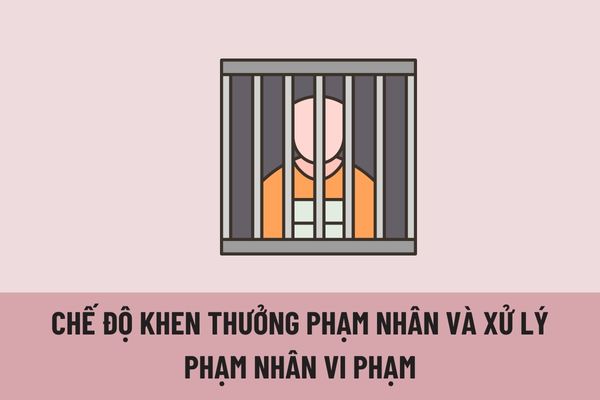Regulations on Rewarding Inmates and Disciplining Inmates for Violations During Imprisonment
What types of commendations are available for inmates serving prison sentences?
Based on the provisions of Clause 1, Article 41 of the Law on Execution of Criminal Judgments 2019, the types of commendations for inmates serving prison sentences are as follows:
During the period of serving a prison sentence, inmates who comply well with the regulations of the detention facility, achieve accomplishments in labor, study, or perform meritorious acts will be commended in one or more of the following forms:
- Commendation;- Monetary or in-kind rewards;- Increased frequency of phone calls, family visits, and receipt of gifts.

Regulations on commendation and handling of violating inmates serving prison sentences.
Who has the authority to decide on the commendation of inmates?
Based on the provisions of Clause 2, Article 41 of the Law on Execution of Criminal Judgments 2019, the regulations are as follows:
Commendation of inmates
2. The warden of the prison, the warden of the detention center under the Ministry of Public Security, the warden of the detention center under the Ministry of National Defense, the head of the provincial criminal judgment execution agency, and the head of the regional military criminal judgment execution agency have the authority to decide on the commendation of inmates. The commendation must be documented and included in the inmate’s file. Commended inmates may be considered for a reduction in the duration of their prison sentence in accordance with the law.
The warden of the prison, the warden of the detention center under the Ministry of Public Security, the warden of the detention center under the Ministry of National Defense, the head of the provincial criminal judgment execution agency, and the head of the regional military criminal judgment execution agency have the authority to decide on the commendation of inmates.
What forms of disciplinary actions are applied to violating inmates?
Based on the provisions of Clause 1, Article 43 of the Law on Execution of Criminal Judgments 2019, the forms of disciplinary actions for inmates violating regulations while serving prison sentences are as follows:
Inmates violating the regulations of the detention facility or committing acts that violate the law will be disciplined based on the nature and severity of the violation with one of the following forms:
- Reprimand;- Warning;- Isolation in a disciplinary chamber for up to 10 days.
What are the mitigating circumstances for disciplinary forms applied to inmates?
Based on the provisions of Article 21 of the Decree 133/2020/ND-CP, the mitigating circumstances for disciplinary forms are as follows:
- First-time offenses that do not cause significant consequences; sincere and honest self-reporting about one’s own and others' violations; proactively preventing the violations of other inmates; actively remedying the consequences caused by oneself (if any).- Genuine remorse, acknowledgment of mistakes, willingness to accept criticism, and active engagement in education and correction.- Violations due to threats, coercion, manipulation or incitement by other inmates; mental agitation caused by the violations of others or other objective reasons.- Performing meritorious acts or achieving notable accomplishments in prison activities, receiving commendations.- Elderly inmates, specifically males aged 70 or older, females 65 or older; inmates with disabilities or those with physical or mental weaknesses; inmates with terminal illnesses, severe illnesses; those with reduced cognitive or behavioral control; pregnant female inmates, those on maternity leave, or those raising children under 36 months old; inmates under 18 years of age.
What are the aggravating circumstances for disciplinary forms applied to inmates?
Based on the provisions of Article 22 of the Decree 133/2020/ND-CP, the aggravating circumstances for disciplinary forms applied to inmates are as follows:
- Organized violations, acting as the mastermind, leader, initiator, or actively and directly committing the violation; directing, threatening, coercing, manipulating, or inciting other inmates to violate.- Continuous violations over a long period; multiple violations or involving many people; using sophisticated and deceitful tactics; exhibiting violent and aggressive behavior; using means, objects, or weapons with lethal potential; causing significant consequences or damages.- Refusal to accept responsibility, dishonestly admitting to mistakes or violations; providing false information, deliberately evading or concealing violations; covering up for fellow offenders; obstructing evidence provision, hindering, confronting, or complicating the investigation and handling of violations; retaliating against informants or witnesses.- Reluctance to accept education, refusal to correct violations; previously educated, reminded, or disciplined but continuing violations.- Taking advantage of natural disasters, fires, floods, or other exceptionally difficult circumstances to violate; violations committed against individuals under 18 years old, pregnant female inmates, those on maternity leave; inmates raising children under 12 months old; inmates who are ill, weak, disabled, or have reduced cognitive or behavioral control.
LawNet